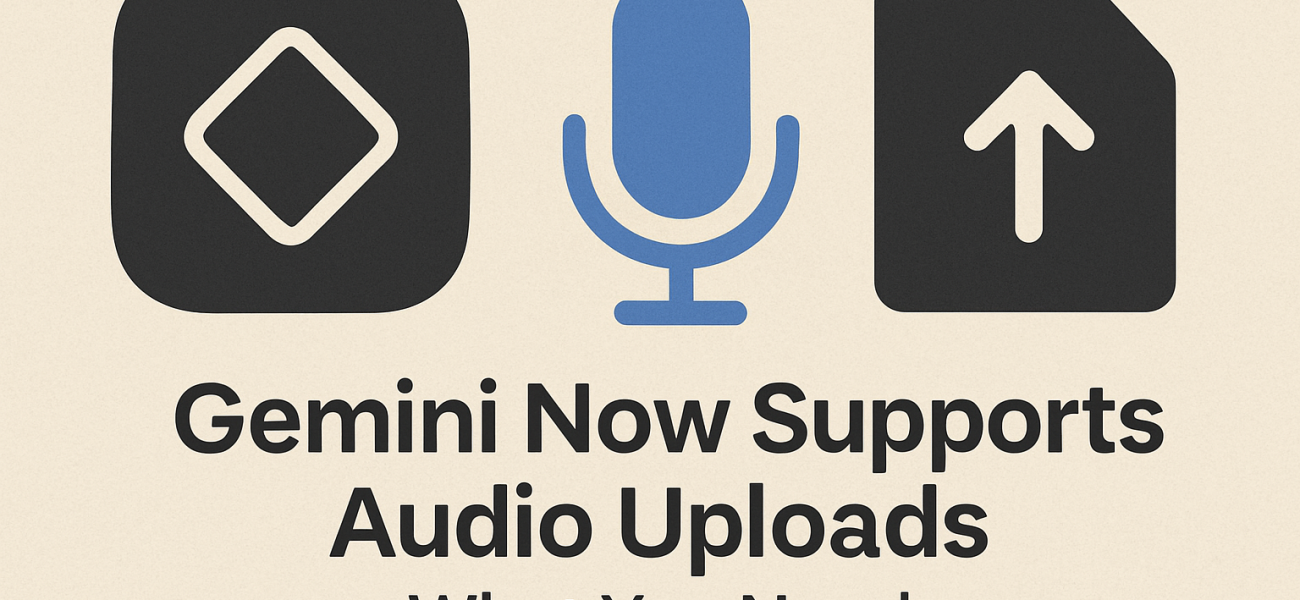Introduction to Google Gemini’s New Audio Feature
In the ever-evolving landscape of AI marketing, Google continues to push boundaries with its Gemini app. Recently, the company announced a significant update that now allows users to upload audio files directly into Gemini for analysis and content creation. As businesses increasingly turn to audio content, this new feature is poised to enhance campaign performance across various industries.
Understanding the New Capabilities of Google Gemini
Google’s Gemini app now allows users to improve their workflow by enabling audio file uploads, a feature that has been highly requested by marketers and content teams alike. Users can seamlessly integrate recordings into their existing multi-file workflow that includes documents and images, streamlining the entire content creation process.
Key Features of Audio File Uploads
The new update allows users to attach up to ten files per prompt, with audio files being accepted alongside zip files. This capability is particularly valuable for those handling raw audio tracks from interviews or podcasts, enabling users to upload multiple takes in one action. Such functionalities pave the way for more efficient content repurposing and summarization.
Plan Limitations and Guidelines
Google has set specific limitations for each plan concerning audio file uploads. For users on the Free plan, the total audio length allowed is up to 10 minutes per prompt with a cap of five prompts daily. In contrast, the AI Pro and AI Ultra plans allow a generous total audio length of up to 3 hours per prompt.
Users can upload up to ten files across supported formats, making it vital to stay informed about the limits outlined in Google’s Help Center, especially as they may change periodically.
Why This Update is Groundbreaking for Marketers
This new feature is a game changer for teams that regularly work with audio content, such as podcasts, webinars, and interviews. Previously, the need to transcribe audio files using separate tools created inefficiencies and extra steps in content workflows.
Streamlining Content Creation from Audio
Now, the workflow becomes much smoother; for instance, marketing professionals can upload a complete interview and instantly convert it into show notes, pull quotes, or even a draft article—all without leaving the Gemini interface. This integrated approach significantly reduces the friction traditionally associated with managing different content formats.
Addressing Challenges in Teams with Heavy Meeting Loads
For organizations that run frequent strategy meetings, the ability to directly upload recorded sessions into Gemini transforms how teams generate actionable insights. A recorded meeting can be easily converted into actionable items and concise briefs, allowing teams to maintain productivity without the hassle of using additional software for transcription.
Reducing Handoffs: A Practical Advantage
The integration of audio uploads directly into Gemini is a significant step towards a more fluid content creation process, reducing the need for iterative handoffs between tools, says Linda Thompson, a digital marketing strategist.
This quote encapsulates the essence of the feature, emphasizing how it can enhance operational efficiency. With everything occurring in one platform, users can minimize the time-consuming process of transferring content between various applications, which often leads to lost information and confusion.
Best Practices for Using Audio Uploads
To optimize the use of this new feature, it is advisable to upload audio files along with any relevant supporting context in the same prompt. This approach enables Gemini to generate clearer and more coherent summaries and excerpts.
If users are operating on the Free plan, it’s essential to stay within the 10-minute limit per prompt to maximize effectiveness. Conversely, for longer sessions or podcasts, users should consider upgrading to the AI Pro or Ultra plans for an optimal experience.
The Future of Audio Integration in Google Gemini
As the landscape of digital marketing evolves, so too does the functionality of platforms like Google Gemini. Users should keep an eye on potential updates regarding length limits and files allowed, as these will dictate how audio is leveraged within campaigns.
Potential for Enhanced Workspace Integration
Additionally, stronger integrations with Google Workspace tools, such as Google Meet, could further enhance the ease of uploading recorded content into Gemini. As Google refines its offerings, features aimed at automating these processes could significantly amplify the overall user experience.
Conclusion: Embracing the Change for Better Outcomes
The introduction of audio file uploads marks a new chapter for Google Gemini and its user base. As companies harness the power of audio content more effectively, tools that facilitate seamless integration will lead to better campaign performance and a more efficient content creation process. This evolution represents a significant opportunity for marketers to elevate their strategies and maximize output.
For marketers and content creators, this update is not just an enhancement; it’s a means to harness the full potential of AI-driven content automation, remarked Michael Johnson, an expert in digital content strategies.
In conclusion, the integration of audio-upload capabilities into Google Gemini is a forward-thinking move that not only meets user demands but also adapts to current market needs. As businesses navigate the complexities of modern marketing, leveraging tools like these will be critical for achieving excellence in campaign execution.
With Google’s continuous improvements, it’s clear the landscape of AI marketing is changing rapidly. Professionals must stay informed about these updates to utilize available tools effectively and efficiently, ensuring they remain at the cutting edge of their fields.


